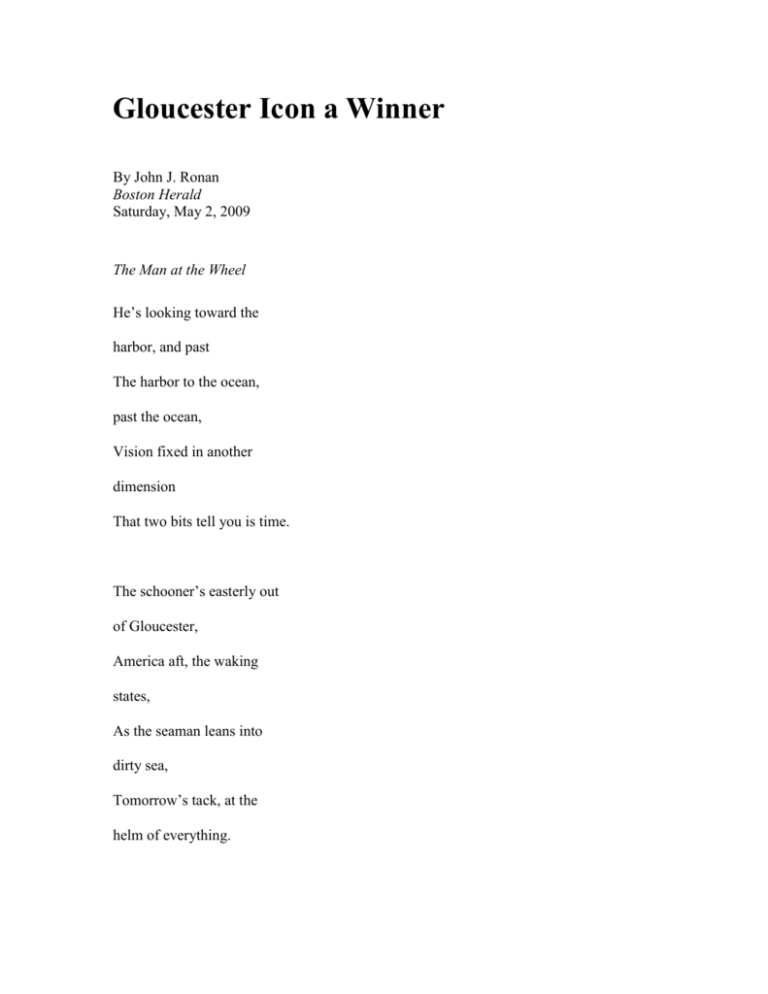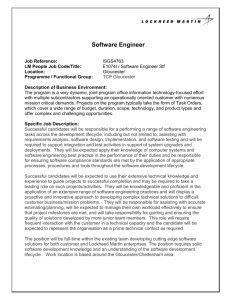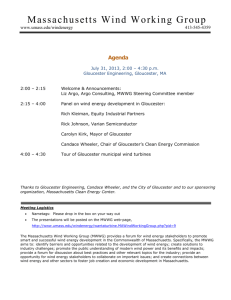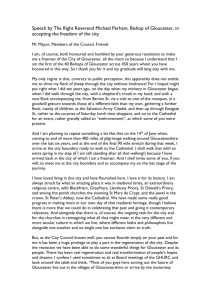In Gloucester, poetic license or media lies
advertisement

Gloucester Icon a Winner By John J. Ronan Boston Herald Saturday, May 2, 2009 The Man at the Wheel He’s looking toward the harbor, and past The harbor to the ocean, past the ocean, Vision fixed in another dimension That two bits tell you is time. The schooner’s easterly out of Gloucester, America aft, the waking states, As the seaman leans into dirty sea, Tomorrow’s tack, at the helm of everything. On Feb. 9, Governor Duval Patrick opened an online, three-week voting period to allow the commonwealth’s citizens to choose the image that would decorate Massachusetts’ new quarter. One hundred sites were on the ballot, culled from an original list of more than 4,000. By the time the election closed on Feb. 26, Gloucester’s The Man at the Wheel had won in a landslide. The new round of coins, from all the states, will begin appearing in 2010. The Gloucester statue collected 109,817 votes, with Lowell’s National Historic Park a distant second at 26,582. Salem’s House of Seven Gables logged only 10,028 votes and the USS Constitution in Boston, 8,890. Why Gloucester? Lowell and Salem are worthy cities. And Boston’s Old Ironsides is a revered heirloom. With a population of just 30,000, Gloucester is not large enough to stuff the ballot box. Neither was there any Us vs. Them factor, as when David Ortiz rolled over Hideki Matsui in last year’s All-Star balloting. No, the landslide vote was a confirmation that The Man at the Wheel is bigger than Gloucester, bigger even than Massachusetts. As the Gateway Arch in St. Louis opens America’s West, as the Sears Tower in Chicago defines the big shoulders of the Heartland and as the Liberty Bell in Philadelphia recalls the Revolution, The Man at the Wheel looks far beyond his own city. He sums part of the American spirit, and so reaches across the state, the region, to become finally a symbol of and for the country. The Man at the Wheel has gone national. Leonard Craske’s sculpture, cast in 1925, started and remains a monument to Gloucester fishing and the men lost at sea. The pilot bends forward over the wheel of a schooner, in rain gear, staring into rough weather. Like the Gateway Arch, the Sears Tower and the Liberty Bell, The Man at the Wheel perfectly sums up his city. It is Gloucester, capturing in one icon the courage and stamina of a community nearing its 400th birthday. But just as Gloucester leads the nation east every morning, The Man at the Wheel has become the country’s pilot. America follows in his wake. Gloucester even led the way into recession, plunging into harsh downturn months before the rest of the country, reminding some of the noir tragedy that overtook Manuel in “Captains Courageous.” Spencer Tracy won an Oscar for that 1937 performance, but Spencer doesn’t live here any more. This dynamic and hardworking city will continue to lead through heavy seas, fashioning the economies and hopes of a new day. John J. Ronan Gloucester Poet Laureate In Gloucester, poetic license or media lies? Media’s coverage fishy in Gloucester By John J. Ronan Boston Herald Sunday, July 13, 2008 Winslow Homer’s Gloucester is dynamic, hardworking and beautiful. In “Shipbuilding: Gloucester Harbor” and “Sailing Out of Gloucester,” he captured heritage and beauty at once. “Gloucester Houses” and “Prospect Street,” under the hammer of Edward Hopper’s light, portray a strong, stable Gloucester. In 2008, the city is still dynamic, hardworking, stable - and beautiful. For those who know this, and love Gloucester because of it, the coverage of teen pregnancies here dismays. Not the factual coverage. It is tragic that so many girls, for the bleakest reasons, chose to become pregnant. The city is saddened by this and working to stop what has to be termed an epidemic. The message is not the problem. Embarrassment is not a problem, either; no one I know is afraid of confronting a flawed civic self in the mirror. It’s the lie that’s a problem. The problem began in Time, in a June 18 piece stuffed with dated clichés. Gloucester is a “fiercely Catholic enclave,” a phrase inaccurate on several counts that conjures villagers gathering with torches. The city is “mostly blue-collar,” though the median market price of homes is about $400,000. Time also referred to the decrease in fishing in Gloucester’s economy. True enough, but decades late. I expected the piece to announce Spencer Tracy’s Oscar for Captains Courageous, the 1937 movie that seemed the source of the article’s tone. Uninformed piety ran through most print outlets; television was worse. Descriptions of Gloucester as a “hard luck” community were common. It is a “poor town” where “fishing has tanked.” Skewed clichés marked most broadcast and cable coverage, topped by the usual whoppers on Fox. And some announcers didn’t bother to look up the pronunciation; I heard ‘glow-chester’ at least once. The lie? The false image of Gloucester. The drawing of a shabby, Depression-drab landscape that is neither accurate or honest: a fat, lazy lie. But a noir backdrop is necessary to the melodrama of blame. Blame the folk and blame the benighted place that created them. The essential fiction is that a dark anomaly has been discovered, a distortion that lets the world feel better about its own aloof and undistorted self. It’s an ancient tradition, of course, kept alive today by television’s many blame-and-bounce entertainment franchises. Sadly, the format also disguises itself as news. When a city is in the national spotlight, those who know the city well get a clear, x-ray vision of media integrity, from the inside out. Dismay comes from not finding it. Some balk at the word “lie,” preferring euphemisms like “misstatement” or “inaccuracy.” In Gloucester, on Main St., at the library, in city hall, on the wharves, at the Crow’s Nest, we are more frank. Our officials are doing their best to combat the false image of Gloucester with fact, so often now an ironic enemy of news. Gloucester certainly has problems. But they are not anomalous. It has, on average, about the same frequency of teen pregnancy as other cities. It has poverty, of course. But because Gloucester is, politically and demographically, a city, rather than a suburban slice of the middle class, it includes all strata, rags to riches. And recently, more poverty than money, reflecting a growing disparity in the country. Gloucester is America. The spotlight will soon pan to new marketable scandals. Gloucester, the real Gloucester, will survive, at once dynamic, hardworking, stable. And still beautiful, still the city of Homer and Hopper. Its people are beautiful, too. As Gloucester nears its 400th birthday, they are working on problems, meeting challenges, making progress. No surprise here. Gloucester will endure: Waves break on outcrop rock: granite, fire-formed and hard, headland granite no coddled cape, no sandbar, and nothing soft in its city, no knickknack, Gloucester-by-God, attitude granite. John J. Ronan Gloucester Poet Laureate






